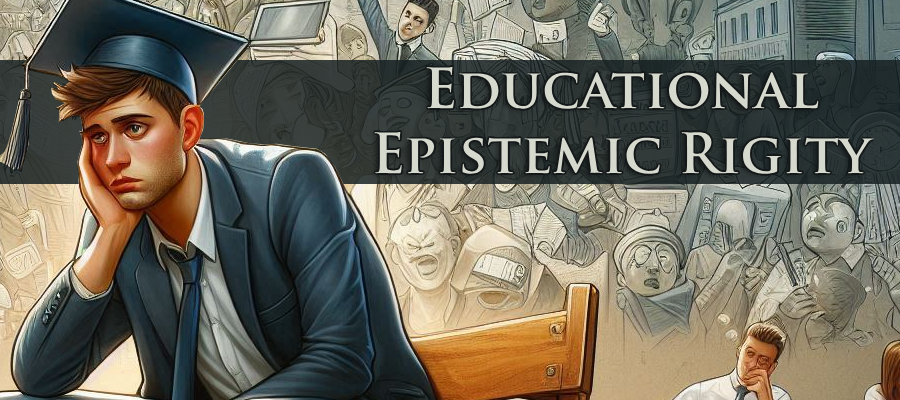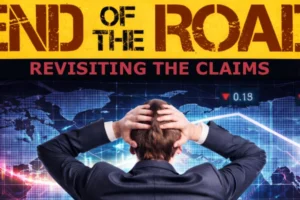Epistemic Rigidity from an Education POV
In our search for truth and accuracy, many individuals often find themselves hindered by cognitive biases that impede their ability to discard inaccurate information and progress their knowledge. I contend that if we can gain a deeper understanding of the obstacles to intellectual growth, we can also develop strategies to overcome them. So, today, I want to explain this phenomenon through the lens of Epistemic Rigidity, a theory that explains why so many people struggle to update their beliefs and practices.
Epistemic Rigidity essentially describes a phenomenon of various cognitive biases overlapping to keep people from realizing growth or acquiring new information. Here, I will explain its makeup and provide you with an example of how it can play out, using an educational setting as an example. I will also provide some steps to overcome this phenomenon. Keep in mind that this is merely an overview.
The Components of Epistemic Rigidity
The Einstellung Effect
The Einstellung effect, a cognitive bias where a familiar solution blocks the discovery of a better one, is particularly pertinent among experts. In a series of experiments involving chess players, it was found that even highly skilled players could be trapped by familiar but suboptimal solutions. This effect really demonstrates the dual nature of expertise: while extensive knowledge can enhance problem-solving capabilities, it can also lead to inflexibility. That’s definitely something we need to be aware of. However, the good news is that it was also found that the more expert an individual becomes, the less prone they are to this inflexibility, suggesting a nuanced interplay between expertise and cognitive rigidity.
The Einstein Effect
The Einstein effect describes the tendency for people to find statements more credible if they come from a scientist or some authoritative figure, even when the information is inaccurate. This bias demonstrates the authoritative weight that expertise can carry, sometimes leading to the uncritical acceptance of erroneous ideas. In educational contexts, this effect can perpetuate outdated or incorrect information, as students and less experienced professionals defer to the perceived infallibility of their mentors.
The Dunning-Kruger Effect
The Dunning-Kruger effect is a cognitive bias where individuals with limited knowledge or expertise overestimate their competence. I have written about this before, but this effect is particularly pronounced among novices who lack the metacognitive ability to recognize their shortcomings (the overconfidence novice). In educational progression, this manifests as overconfidence in the early stages of learning, with a gradual realization of one’s own limitations as expertise develops.
Anchoring Bias
Anchoring bias occurs when individuals rely too heavily on the first piece of information they receive about a topic. This initial anchor typically skews perception and judgment and leads to persistent misconceptions. In educational settings, the first information provided by authoritative sources (e.g., textbooks, professors) can become entrenched, making it difficult for students to revise their understanding in light of new evidence.
Other Factors
In addition to the cognitive biases and social influences discussed, we need to understand that other factors contribute to the persistence of outdated knowledge and hinder knowledge advancement as well. These include organizational inertia stemming from entrenched practices, bureaucratic processes, and resistance to change within institutions. Organizational culture often shapes beliefs and behaviors as well, influencing how new information is received and integrated.
Furthermore, economic considerations, such as financial investments in existing technologies or methodologies, may create barriers to adopting new knowledge. For that matter, technological advancements and information overload also pose challenges, as they can overwhelm individuals and organizations, making it difficult to discern relevant and reliable information. So, let’s take a moment to see exactly how this might play out. I’ll use educational advancement as an example.
Epistemic Rigidity and Educational Progression – An Example
High School to Bachelor’s Degree
High school graduates often enter undergraduate programs with a sense of openness to new ideas. However, as they progress through their bachelor’s degree, they tend to become anchored to the information provided by their professors. This anchoring, combined with the Dunning-Kruger effect, can lead to a false sense of mastery and a reluctance to consider alternative perspectives.
Bachelor’s to Master’s Degree
At the master’s level, students begin to encounter more complex and nuanced information, challenging their previously held beliefs. This stage often involves a critical re-evaluation of knowledge, where the Einstellung effect can either hinder or facilitate intellectual flexibility, depending on the individual’s ability to question familiar solutions.
Master’s to Doctorate
Doctoral students dive deeper into their fields. They are literally forced to encounter the limitations of existing knowledge and the need for interdisciplinary approaches. The Einstein effect can still influence their acceptance of information from authoritative sources, but the rigorous demands of doctoral research tend to promote a more skeptical and analytical mindset.
Doctorate with Experience
Experienced professionals and scholars are provided a unique opportunity to recognize the vastness of unknowns in their fields. Their extensive knowledge base allows for greater cognitive flexibility, which can mitigate the Einstellung effect. However, anchoring bias and the Einstein effect can still pose challenges, which merely demonstrates the importance of continuous critical engagement with new information.
Practical Strategies to Overcome Epistemic Rigidity
Indeed, the theory of Epistemic Rigidity describes a potentially dark outcome regarding knowledge acquisition. However, it can be overcome with a little effort. To overcome Epistemic Rigidity effectively, it’s important to stay humble about what you know, acknowledging the limitations of your knowledge while remaining open to new ideas and perspectives. Continuously update your skills and knowledge by engaging with diverse fields, collaborating across disciplines, and staying informed about the latest research. Reflect on your own thinking processes to recognize and mitigate biases, fostering a more informed decision-making approach.
Furthermore, I would encourage you to embrace different perspectives by actively seeking out and considering viewpoints that challenge your own, which broadens your understanding and enhances critical thinking. Encourage environments that value questioning and analyzing information critically, promoting deeper understanding over rote acceptance. And finally, guide your decisions and problem-solving efforts with empirical evidence and reliable methodologies, all while remaining aware of the limitations, your emotional contortions, and potential biases within research findings.
Now, it’s neither simple nor easy to overcome. However, understanding the cognitive biases that impede the advancement of knowledge is crucial for individuals at all levels of expertise. However, only by recognizing the influences of Epistemic Rigidity can we develop strategies to overcome these obstacles at all levels and foster a culture of continuous learning and intellectual growth moving forward. So, I hope this article helps you do just that.
I will close with a statement of hope. Let us never forget that information provides us with context, which enables informed experience. This combination of context and experience fosters expertise. Expertise, in turn, typically reveals the flaws in the initial context, ultimately enhancing and refining our knowledge and information. Of course, this growth only happens when we let it. My hope is that one day, we can all see the true value of being wrong once in a while and embrace the power that can be had by attempting to be accurate over “right.”
Learn more about Epistemic Rigidity by clicking here.




